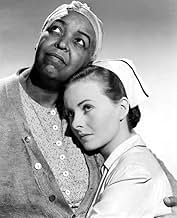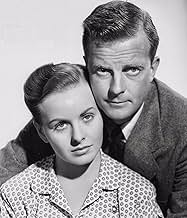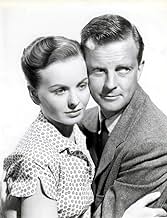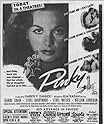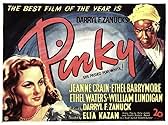IMDb RATING
7.2/10
3.7K
YOUR RATING
A light-skinned black woman falls in love with a white doctor, though he is unaware of her true race.A light-skinned black woman falls in love with a white doctor, though he is unaware of her true race.A light-skinned black woman falls in love with a white doctor, though he is unaware of her true race.
- Nominated for 3 Oscars
- 3 wins & 4 nominations total
Fred Aldrich
- Townsman
- (uncredited)
Shelby Bacon
- Boy
- (uncredited)
Betty Beard
- Minor Role
- (uncredited)
Rene Beard
- Teejore
- (uncredited)
Arthur Berkeley
- Townsman
- (uncredited)
Patsy Boniface
- Minor Role
- (uncredited)
Mildred Boyd
- Nurse
- (uncredited)
Featured reviews
What was fascinating and groundbreaking in 1949 is now a bit old fashioned when it comes to the film Pinky. Like Guess Who's Coming To Dinner a generation later, 20th Century Fox and director Elia Kazan went as far as they could and not hurt the box office.
Remember after all even with 'message' pictures, people have to come to the theater to see and get the message.
If it were done 20 years later someone like Lena Horne would have been cast in the part of Pinky. It was the kind of role that Lena wanted to do at MGM, but they wouldn't give her, they wouldn't be that bold. Still I can't fault Jeanne Crain's performance which got her an Oscar nomination for Best Actress. She lost the Oscar sweepstakes to Olivia DeHavilland for The Heiress.
Crain as Pinky has come home to her southern town after many years of living in the north and passing for white with her light features. As she puts she started when a train conductor escorted to the white section of a train she was riding on back when she left to go to nursing school. Of course the news that she's done that is shocking to her grandmother Ethel Waters who raised her.
It's also a culture shock to Crain to come home and relearn segregated ways after living in the north. When Sammy Davis, Jr. wrote his autobiography Yes I Can he said he learned about racism for the first time in the army. Working in show business with his dad and uncle where he was a child performer like Michael Jackson was with his brothers he was insulated from the realities of the outside world. Show business was a cocoon for Davis just as passing was for Crain's Pinky character. She has some nasty incidents including one with Nina Mae McKinney who resents what she sees as high toned ways.
Still Crain through her grandmother accepts a position to be a nurse companion to grand dame Ethel Barrymore who owns quite a bit of property. Her family is the local gentry there and Barrymore is dying. When Barrymore dies she leaves her estate, house and land to Crain and that gets her blood relatives led by Norma Varden all bent out of joint and ready to contest the will.
Which sets the film up for a trial similar to the one in To Kill A Mockingbird although this is a civil matter. The result of which you'll have to see the film for.
Besides those already mentioned look for sterling performances by Basil Ruysdael as Crain's attorney, William Lundigan as a white doctor who has fallen for Pinky, and Griff Barnett as a sympathetic doctor.
The two Ethels, Barrymore and Waters, both received Oscar nominations for Best Supporting Actress. And as luck would have it Celeste Holm and Elsa Lanchester were also nominated in that same category for Come To The Stable. So with two double nominees for two pictures, Mercedes McCambridge went right up the middle and won for her performance in All The King's Men. Made easier of course by the fact that Mercedes was also in the Best Picture of 1949.
Pinky is both old fashioned and groundbreaking. We'd never see casting like this again, but at the same time we can applaud the courage and daring it took for 20th Century Fox to make this film and for Jeanne Crain who got her career role out of it.
Remember after all even with 'message' pictures, people have to come to the theater to see and get the message.
If it were done 20 years later someone like Lena Horne would have been cast in the part of Pinky. It was the kind of role that Lena wanted to do at MGM, but they wouldn't give her, they wouldn't be that bold. Still I can't fault Jeanne Crain's performance which got her an Oscar nomination for Best Actress. She lost the Oscar sweepstakes to Olivia DeHavilland for The Heiress.
Crain as Pinky has come home to her southern town after many years of living in the north and passing for white with her light features. As she puts she started when a train conductor escorted to the white section of a train she was riding on back when she left to go to nursing school. Of course the news that she's done that is shocking to her grandmother Ethel Waters who raised her.
It's also a culture shock to Crain to come home and relearn segregated ways after living in the north. When Sammy Davis, Jr. wrote his autobiography Yes I Can he said he learned about racism for the first time in the army. Working in show business with his dad and uncle where he was a child performer like Michael Jackson was with his brothers he was insulated from the realities of the outside world. Show business was a cocoon for Davis just as passing was for Crain's Pinky character. She has some nasty incidents including one with Nina Mae McKinney who resents what she sees as high toned ways.
Still Crain through her grandmother accepts a position to be a nurse companion to grand dame Ethel Barrymore who owns quite a bit of property. Her family is the local gentry there and Barrymore is dying. When Barrymore dies she leaves her estate, house and land to Crain and that gets her blood relatives led by Norma Varden all bent out of joint and ready to contest the will.
Which sets the film up for a trial similar to the one in To Kill A Mockingbird although this is a civil matter. The result of which you'll have to see the film for.
Besides those already mentioned look for sterling performances by Basil Ruysdael as Crain's attorney, William Lundigan as a white doctor who has fallen for Pinky, and Griff Barnett as a sympathetic doctor.
The two Ethels, Barrymore and Waters, both received Oscar nominations for Best Supporting Actress. And as luck would have it Celeste Holm and Elsa Lanchester were also nominated in that same category for Come To The Stable. So with two double nominees for two pictures, Mercedes McCambridge went right up the middle and won for her performance in All The King's Men. Made easier of course by the fact that Mercedes was also in the Best Picture of 1949.
Pinky is both old fashioned and groundbreaking. We'd never see casting like this again, but at the same time we can applaud the courage and daring it took for 20th Century Fox to make this film and for Jeanne Crain who got her career role out of it.
Elia Kazan took over the helm of PINKY when John Ford requested replacement as having no real interest in the story. He not only took over, but he did a superb job.
Personally, it took awhile for me to get over the idea of casting JEANNE CRAIN as a light-skinned black, but she does some of her best work here. Same can be said of Ethel Waters and Ethel Barrymore, and not surprisingly, all three actresses were nominated for Oscars. Undoubtedly, all benefited by Kazan's firm direction.
The story is essentially written to show the racial bigotry that existed (and still does) in many parts of the South. Without going into plot development, let's say the ending is a bit predictable, but the film still remains powerful and sensitive in its treatment of the subject matter.
In 1949, this was a daring film for Fox to make, risking the possibility of hurting the reputation of its most popular box-office star at that time, Jeanne Crain. But credit goes to Darryl F. Zanuck for permitting his studio to make films like THE SNAKE PIT and GENTLEMAN'S AGREEMENT, risky and controversial. The box-office results and critical acclaim justified the risk.
Well worth seeing, absorbing and sensitive.
Personally, it took awhile for me to get over the idea of casting JEANNE CRAIN as a light-skinned black, but she does some of her best work here. Same can be said of Ethel Waters and Ethel Barrymore, and not surprisingly, all three actresses were nominated for Oscars. Undoubtedly, all benefited by Kazan's firm direction.
The story is essentially written to show the racial bigotry that existed (and still does) in many parts of the South. Without going into plot development, let's say the ending is a bit predictable, but the film still remains powerful and sensitive in its treatment of the subject matter.
In 1949, this was a daring film for Fox to make, risking the possibility of hurting the reputation of its most popular box-office star at that time, Jeanne Crain. But credit goes to Darryl F. Zanuck for permitting his studio to make films like THE SNAKE PIT and GENTLEMAN'S AGREEMENT, risky and controversial. The box-office results and critical acclaim justified the risk.
Well worth seeing, absorbing and sensitive.
Well-mannered nurse Jeanne Crain (as Patricia "Pinky" Johnson) returns to her poor "Black" neighborhood, in Mississippi. There, she is welcomed by washerwoman grandmother Ethel Waters (as Granny). The pair are confronted by racism both outside and inside their home. Most importantly, it is revealed that Ms. Crain has been "passing" as "White". Moreover, Crain has become engaged to Caucasian doctor William Lundigan (as Thomas Adams). While working at home, to support Crain's nursing education, Ms. Waters has grown close to ailing Ethel Barrymore (as Miss Em). At first, Crain does not understand or accept the friendship between Waters, a former slave, and Ms. Barrymore, a former plantation owner. But, for her grandmother, Crain agrees to become Barrymore's nurse.
"Pinky" is a nerve-rattling classic.
Probably, the most obvious "debate" point was the casting of Crain in the title role. Crain was definitely "pink" enough (or, white-looking); but, her general "movie star" persona makes the casting decision seem risky. Yet, Crain, under Elia Kazan's direction, triumphs. There are so many ways Crain could have fallen into acting traps - she could have used mannerisms, make-up, and/or other stereotypical devices to "camp" up the "Black" - but, she avoids each trap. Crain performs the role with a great amount of dignity. She was deservedly honored with an "Academy Award" nomination.
Barrymore and Waters also perform well (as you might expect).
We are never, in the film, given a clear statement of facts regarding the heritage of Crain's "Pinky". My guess is that she is related, by blood, to both Waters and Barrymore. An attempted rape of Crain's character accounts, arguably, for her pink appearance; this might have occurred in more than one generation. It's also possible that a loving "mixed race" relationship was part of either Ethel's past. Making the "Black/White" history more clear would have only gotten the film into more trouble.
"Pinky" was quickly censored, and headed for the US Supreme Court.
One of the Board of Censors' objections was, "a white man retaining his love for a woman after learning that she is a Negro." However, Mr. Lundigan's "Thomas" is only willing to retain his love under certain conditions; and, this leads to a sharp, less "Hollywood"-styled ending. The Supreme Court was correct. Some of the film's best scenes show the way Crain is treated after other characters learn she is not white.
********* Pinky (9/29/49) Elia Kazan ~ Jeanne Crain, Ethel Barrymore, Ethel Waters, William Lundigan
"Pinky" is a nerve-rattling classic.
Probably, the most obvious "debate" point was the casting of Crain in the title role. Crain was definitely "pink" enough (or, white-looking); but, her general "movie star" persona makes the casting decision seem risky. Yet, Crain, under Elia Kazan's direction, triumphs. There are so many ways Crain could have fallen into acting traps - she could have used mannerisms, make-up, and/or other stereotypical devices to "camp" up the "Black" - but, she avoids each trap. Crain performs the role with a great amount of dignity. She was deservedly honored with an "Academy Award" nomination.
Barrymore and Waters also perform well (as you might expect).
We are never, in the film, given a clear statement of facts regarding the heritage of Crain's "Pinky". My guess is that she is related, by blood, to both Waters and Barrymore. An attempted rape of Crain's character accounts, arguably, for her pink appearance; this might have occurred in more than one generation. It's also possible that a loving "mixed race" relationship was part of either Ethel's past. Making the "Black/White" history more clear would have only gotten the film into more trouble.
"Pinky" was quickly censored, and headed for the US Supreme Court.
One of the Board of Censors' objections was, "a white man retaining his love for a woman after learning that she is a Negro." However, Mr. Lundigan's "Thomas" is only willing to retain his love under certain conditions; and, this leads to a sharp, less "Hollywood"-styled ending. The Supreme Court was correct. Some of the film's best scenes show the way Crain is treated after other characters learn she is not white.
********* Pinky (9/29/49) Elia Kazan ~ Jeanne Crain, Ethel Barrymore, Ethel Waters, William Lundigan
I've just seen this film for the 3rd time although I'm sure I hadn't seen it for at least 10 years. I had forgotten the depth and intensity of the prejudice displayed in the film. It is taking nothing away from Jeanne Craine's sensitive and beautiful performance to say that the star of the film is Ethel Waters - she is simply a magnificent presence throughout. It is one of those performances where every fibre of being is transmitted thru to the viewer - you cannot help but feel that the character is one of the strongest and bravest women ever shown on screen. Considering the shocking 1950's world of Amos and Andy and the in-every-sense-white-bread fiction world of Hollywood - Father Knows Best, The Donna Reed Show, etc - it is startling to see how movies so transcended the comfort-food level of TV and challenged audiences. This movie belongs, I believe, in the highest echelon of social commentary films - such as To Kill a Mockingbird, Gentlemen's Agreement. Absolute must see!!!
It is not very "in" to like Elia Kazan right now, because he named names in the McCarthy witch-hunts and just received an honorary Oscar, but what a brilliant director he was. And if he didn't show much courage in the Fifties, he sure did in the Forties when he tackled racial prejudice head-on in two excellent movies: "Gentleman's Agreement" and "Pinky" (John Ford is said to have chickened-out of directing this one). "Pinky" is not as good as "Gentleman's Agreement", but it ain't half bad either. Here we see a deeply prejudiced South where black girls are attacked on the streets and shops refuse them service. The scenes are realistic, even brutally filmed, and the language strong for its day.
I'm sure Kazan must have been dismayed to have been given a Hollywood starlet to play the complex lead character - a black woman who looks white - but he managed to extract a damn good performance out of Jeanne Crain. The supporting cast is flawless, down to the smallest role. Kazan knew how to direct actors. Evelyn Varden deserves special mention as a vicious Southern matron. But the most praise must be reserved for the two Ethels - Waters and Barrymore - who are nothing short of brilliant.
Okay, the ending's a little dicky, and predictable, but the intentions of the film-makers are sincere and the results must have been revolutionary in 1949. I love the way Kazan shoots his movies too - long unbroken sequences and tracking shots, and excellent use of light and shadow - both of which probably coming from his stage experience. Kazan combined a strong ability to work with actors and a keen cinematic eye to create some of the best dramatic films of the century. And "Pinky" is one of these.
I'm sure Kazan must have been dismayed to have been given a Hollywood starlet to play the complex lead character - a black woman who looks white - but he managed to extract a damn good performance out of Jeanne Crain. The supporting cast is flawless, down to the smallest role. Kazan knew how to direct actors. Evelyn Varden deserves special mention as a vicious Southern matron. But the most praise must be reserved for the two Ethels - Waters and Barrymore - who are nothing short of brilliant.
Okay, the ending's a little dicky, and predictable, but the intentions of the film-makers are sincere and the results must have been revolutionary in 1949. I love the way Kazan shoots his movies too - long unbroken sequences and tracking shots, and excellent use of light and shadow - both of which probably coming from his stage experience. Kazan combined a strong ability to work with actors and a keen cinematic eye to create some of the best dramatic films of the century. And "Pinky" is one of these.
Did you know
- TriviaJohn Ford was the original director of the film but after seeing dailies, Darryl F. Zanuck felt Ford wasn't connecting with the material. Zanuck called Elia Kazan in New York and asked him to take over the film. Kazan felt he owed Zanuck for his film career and agreed to do the movie without even looking at the script. He flew to Los Angeles and started filming the next Monday.
- GoofsWhen the white officer slaps Rozelia on the left side of her face, she mistakenly rubs the right side of her face.
- Quotes
Pinky Johnson: I'm a Negro. I can't forget it, and I can't deny it. I can't pretend to be anything else, and I don't want to be anything else. Don't you see, Tom?
Dr. Thomas Adams: No, I don't.
Pinky Johnson: You can't live without pride.
- ConnectionsFeatured in Biography: Darryl F. Zanuck: 20th Century Filmmaker (1995)
- How long is Pinky?Powered by Alexa
Details
- Release date
- Country of origin
- Language
- Also known as
- Lo que la carne hereda
- Filming locations
- Production company
- See more company credits at IMDbPro
Box office
- Gross US & Canada
- $4,200,000
- Runtime
- 1h 42m(102 min)
- Color
- Aspect ratio
- 1.37 : 1
Contribute to this page
Suggest an edit or add missing content


